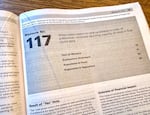Editor’s note: For Election 2024, OPB has been diligently following local races, providing comprehensive coverage of campaigns and measures. Check results on the presidential race, key congressional battles and other outcomes at OPB’s elections page.

In this photo, taken Oct. 14, 2024, the first page of the Measure 117 section in the Oregon Voters' Pamphlet for the November 2024 election is pictured. The text, explanatory statement and arguments for and against the legislative referral run 38 pages, from 75 - 113.
Allison Frost / OPB
Oregonians appear to have rejected a ballot measure that would have established ranked choice voting statewide.
The measure was failing with 60 percent voting against, in partial returns reported Wednesday morning. The Oregonian/OregonLive called the race on Tuesday, saying the measure failed.
Measure 117 would have given Oregonians the option in primary and general elections to rank their preferred candidates for federal and statewide offices: governor, treasurer, attorney general, secretary of state, labor commissioner, Congress and president.
Voters could also choose one candidate and not rank the others, as usual. The measure didn’t apply to state legislative elections and wouldn’t have been into effective until 2028.
Under the proposed system of ranked voting, a candidate would win if they received more than 50% of first-place votes. If that doesn’t happen, the candidate with the fewest first-place votes is eliminated, and those ballots go to each voter’s second choice. This continues until someone earns more than half of the vote.
Measure 117 backers declined to comment on the early results. A spokesperson said they were still waiting for more results.
Measure 117 opponents — including some Republicans — claimed ranked choice voting would be costly, inefficient and unpredictable, and they sought to seize on some voters’ concerns around election integrity.
In August, nearly half of the county clerks in Oregon formed a political action committee that formally opposed the measure, saying their offices lacked the staff and technology needed to implement it. They also said they weren’t consulted enough before legislators sent the measure to voters, and that it could confuse voters at a time of rampant election skepticism and unproven claims of fraud.
However, clerks said their intent in forming a political action committee was solely to raise concerns about the ballot measure, rather than tell Oregonians how to vote.
The ballot measure’s supporters say ranked-choice voting can be an antidote to political polarization by ensuring that candidates have the broadest support possible. Winners would also be more representative of the communities they serve, encouraging voter engagement and promising to quell negative attacks in politics, supporters say.
Committees supporting Measure 117 raised millions of dollars during the campaign, much of which came from Oregon Ranked Choice Voting, a Corvallis-based nonprofit. More than $3.4 million came from out-of-state groups, including more than $2.2 million from Article IV, a nonpartisan Virginia nonprofit that’s spending vast sums of money supporting election reform efforts in multiple states across the country.
Measure 117 was endorsed by a variety of groups, including the League of Women Voters of Oregon and the Oregon American Civil Liberties Union.
Voters have already been using ranked-choice voting in Corvallis and Benton County elections. They are using it for the first time this year in Portland and will begin using it in Multnomah County in 2026. It’s also used in more than 50 places across the country, including Maine and Alaska.
Voters in three other states and the District of Columbia are deciding whether to establish statewide ranked-choice voting in this election cycle.
